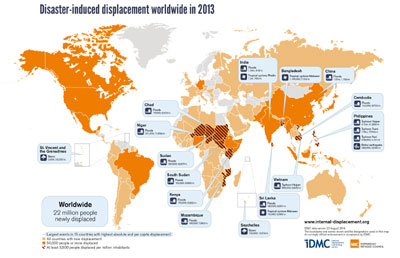"The decisions we make now will determine the future of our economy and our climate," says economist Lord Nicholas Stern, co-chair of the Global Commission on the Economy and Climate. "If we choose low-carbon investments we can generate strong, high-quality growth – not just in the future, but now. But if we continue down the high-carbon route, climate change will bring severe risks to long-term prosperity."
Stern is speaking about the report they released in the run-up to the UN Climate Summit. Co-chaired by former President of Mexico Felipe Calderon (under which national climate legislation was signed into law), the report’s thesis is that rather than harming the economy by addressing climate change, it offers unprecedented opportunities for economic growth.
We all know that, of course. How obvious is it that creating and expanding entirely new industries, such as renewable energy and restoring ecosystems … creates jobs and drives economies?
For example, every $1 invested in wetland restoration generates at least $15 for industries like recreation, fishing, real estate, and tourism, while filtering pollution and protecting coastal communities from extreme weather and flooding.
Read our article, From Rewilder to Localizer, Jobs in 2030.
But the world still needs convincing and a group of 24 international leaders from government, business and finance wrote the report. The authors estimate that an astounding $90 trillion will likely be invested over the next 15 years in energy, urban infrastructure, land use and agriculture, which would not only begin reversing the advance of climate change but greatly improve quality of life.
They emphasize the importance of finalizing an international climate agreement because consistent government policies will create an all-important level playing field that gives companies and investors the signal they need to get serious. Without it, renewable energy could plateau over the next five years.
Their 10-point action plan lays out a path that fights both climate change and poverty by stimulating the global economy in the right direction.
1. Integrate climate action and risk into strategic economic decision-making;
2. Create the confidence needed for global investment and climate action by entering into a strong, lasting and equitable international climate agreement;
3. Phase out subsidies for fossil fuels (which are still rising) and agricultural inputs and incentives for urban sprawl;
4. Introduce strong, predictable carbon prices as part of good fiscal reform;
5. Substantially reduce the capital cost of low-carbon infrastructure investment;
6. Scale up innovation in key low-carbon and climate-resilient technologies and remove barriers to entrepreneurship and creativity;
7. Make connected and compact cities the preferred form of urban development;
8. Halt deforestation of natural forests by 2030;
9. Restore at least 500 million hectares of degraded forests and agricultural land by 2030;
10. Accelerate the shift away from polluting coal-fired power generation.
Evidence of Non-Action
Another report gives us insight into the consequences of non-action. 22 million people were displaced last year because of extreme weather events and the risk of being displaced has doubled over the last 40 years, according to the Norwegian Refugee Council’s Internal Displacement Monitoring Centre.
"Displacement caused by disasters is a global phenomenon that is growing in scale, frequency and complexity," says Jan Egeland,
Secretary General of the Norwegian Refugee Council.
While no region is immune, Asia has born the brunt, where 19 million people fled their homes last year. In the Philippines, typhoon Haiyan alone displaced 4.1 million people. The vast majority of displacements are from flooding and several are from typhoons.

Here’s the Global Commission on the Economy and Climate report:

